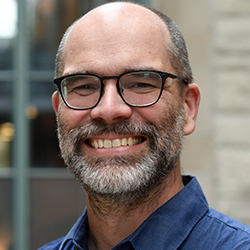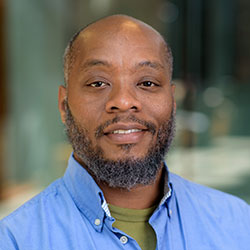Cross-layer Computing Summer School Offers Students Technical Knowledge and Practical Know-How
The Department of Electrical and Computer Engineering hosted a career development workshop for 38 students

A cohort of 38 undergraduate students and first-year graduate students from more than 20 colleges and universities across the country attended the two-day “Cross-layer Computing Summer School: Circuits to System” workshop this month, hosted by Northwestern Engineering’s Department of Electrical and Computer Engineering (ECE).
Sponsored by ECE, the National Science Foundation, Cadence Design Systems Inc., and Texas Instruments, the summer school program was designed to support women and students from underrepresented backgrounds pursuing degrees in computer engineering, electrical engineering, and computer science.

Northwestern Engineering faculty co-organizers included Russell Joseph, associate professor of electrical and computer engineering and of computer science; Seda Ogrenci-Memik, professor of electrical and computer engineering and of computer science; and Qi Zhu, associate professor of electrical and computer engineering and (by courtesy) computer science.


Through a mix of technical talks, career development panels, skills training exercises, and mentoring sessions, the program organizers aimed both to provide students with a broad view of the state-of-the-art technology for modern computing devices and to help students prepare for careers in industry or academia. ECE organized similar workshops in 2018 and 2012.
To encourage open communication and the sharing of ideas and experiences during training sessions, meals, and breaks, two or three mentors — including guest speakers and ECE faculty — were assigned to each of six small groups of students throughout the workshop.
“Our event is built to be more friendly, more personal, and more effective for students to learn compared with other technology-focused workshops,” Gu said.
Skill-building through training exercises
Workshop organizers offered students practical advice during training sessions on presentation skills and the research process.

Ogrenci-Memik presented an example of a single-slide research snapshot that balanced impactful visuals with keywords and specific text that identified the research problem and process, demonstrated progress, and highlighted results.
Next, Joseph shared a tutorial on preparing one-minute elevator speeches of a research problem, why it is important, why the proposed solution is unique and effective, and the impact on the field.

Workshop participants practiced writing and delivering elevator talks on a research topic, project work, or an internship experience within their small groups. Several students volunteered to present to the whole cohort.
The training exercise led by Gu and Zhu centered around conducting research and challenged the workshop groups to examine a topic and address the basic questions: what is the research problem; what are examples of existing solutions; and what new, more effective methods can solve the problem. The six groups had 25 minutes to discuss their assigned topic and then presented their ideas.


Two groups considered a problem related to sleep detection and how to reliably determine a subject’s hours of sleep per night. Teams discussed issues related to consumer privacy, accuracy of metrics, and comfort of wearables used to measure sleep cycles. Proposed solutions included an in-ear sleep monitor with optional GPS technology to alert sleepwalkers of potentially dangerous movement, an eye mask to track REM sleep and sleep cycles, and a motion-sensor equipped mattress pad to detect movement.

“We wanted to give the students an opportunity to practice the important steps in research using real-world, challenging problems,” Zhu said. “We were so impressed by their creativity, breadth of knowledge, depth of understanding, and clear articulation of ideas – many of them are ready for PhD research.”
Learning from experience
In panel discussions focused on industry careers, academic careers, and overcoming challenges, guest speakers and workshop organizers shared personal experiences and lessons they’ve learned.
Panelists provided insights into the choice of pursuing a career in academia or industry; identifying and pursuing impactful research; cultivating constructive mentor relationships; and persevering through challenges and roadblocks.
Prianka Sengupta, a second-year PhD student in computer engineering at Texas A&M University, was motivated to attend the workshop for the opportunity to learn more about the technical topics, connect with people, and get to know Northwestern University as a whole. She found the panel discussions to be most impactful.
"We got to learn both industry and academic perspectives on career direction, growth, challenges, and working environments," Sengupta said. "The advice on graduate school life from Professor Caroline Trippel on how to find a mentor, how to look out for what research topics are getting published, and how to seek help for problems when in doubt was really great.”

Exploring the state of the art
Technical talks focused on computing hardware, computer architecture, circuits, electronic design automation, embedded systems, and semiconductor devices. Guest speakers and topics included:
- Muhammad Khellah (Intel) – “Smart Power Management”
- Michel Kinsy (Arizona State University) – “Secure Hardware and Microelectronics Design Methodologies”
- Alicia Klinefelter (NVIDIA) – “High-Productivity Chip Design: Next Steps in Innovation”
- Hai "Helen" Li (Duke University) – “Brain Inspired Computing: The Extraordinary Voyages in Known and Unknown Worlds”
- Yan Li (Western Digital) – “NAND Flash and its Applications”
- Mark McKelvin, Jr. (The Aerospace Corporation) – “Leveraging Technology to Enable a Digital Transformation of Systems Engineering Practice”
- Terence Randall (Cadence Design Systems, Inc.) – “More than Moore: 3D-IC and Chiplet-based Designs”
- Caroline Trippel (Stanford University) – “Searching for Bugs in Real Computer Systems”
Additional speakers included: Franchon Warmack, the university and diversity program recruiter at Cadence Design Systems Inc.; and Amna Hasnain, director of talent acquisition at Texas Instruments.